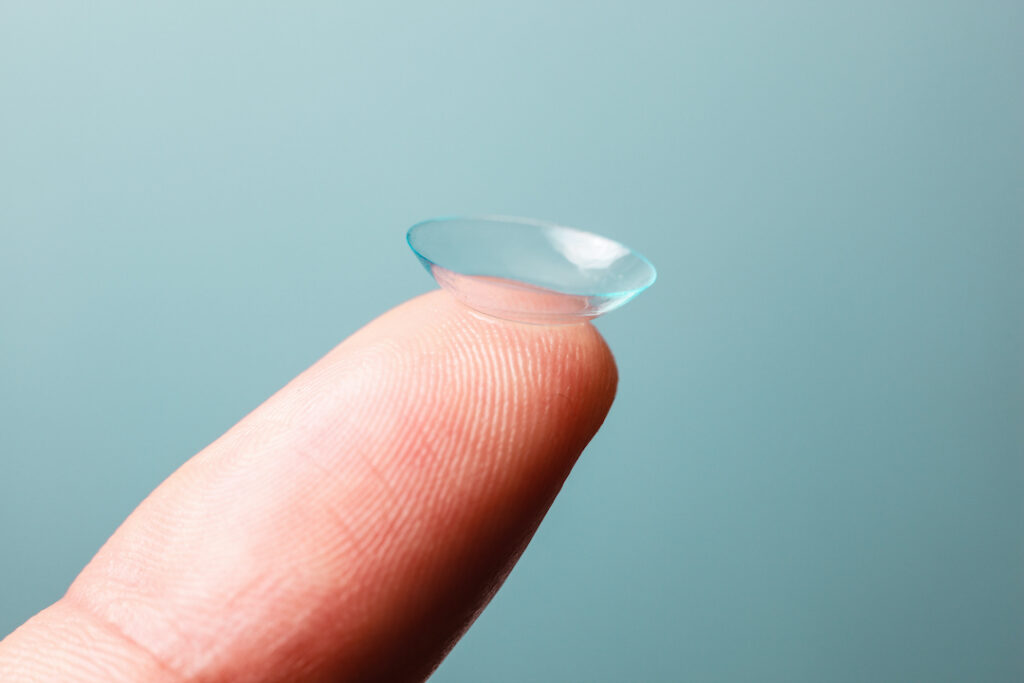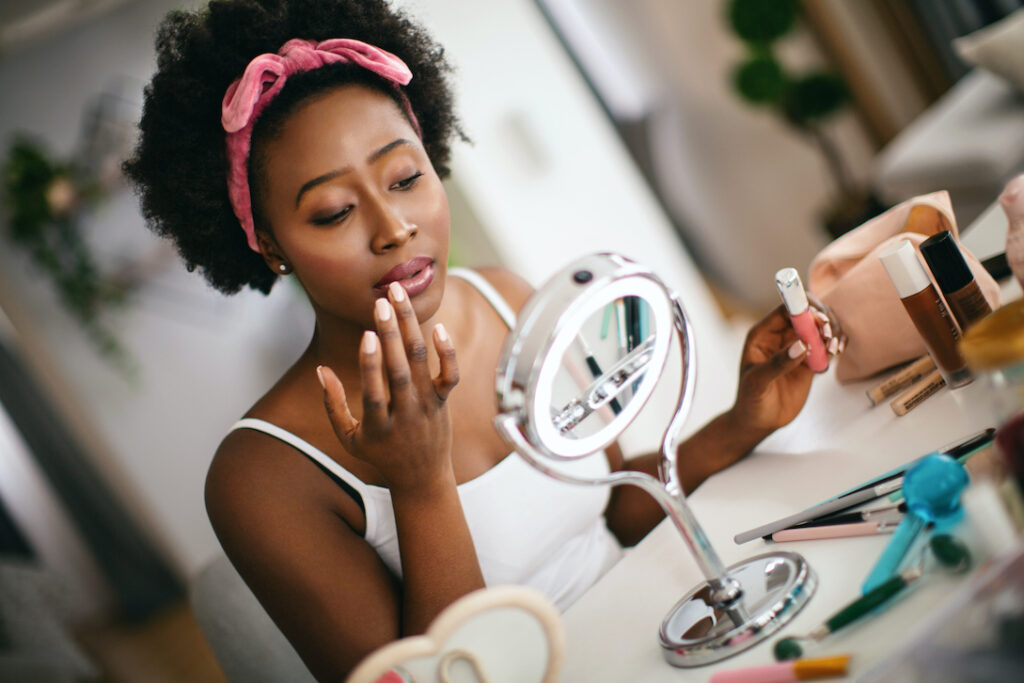Table of Contents
Understanding Contact Lens Discomfort
If you're experiencing discomfort while wearing your contact lenses, don't worry. You're not the only one, and it's often a minor issue
The Culprit Behind Dry Eyes

A Game of Fit and Comfort
An improperly fitting contact lens can be another cause of discomfort. Suppose your contacts don’t fit properly onto your eyeball shape (some folks require toric lenses). In that case, they may move around too much, causing friction against the delicate surface of your eyes, resulting in discomfort or worse – an infection. Eye irritation can occur as a result of this.
Wrong Solution? No Solution.
Using the wrong contact solution could also lead to issues. Some solutions might react with certain types of lenses, leading to blurred vision and increased risk for infections. So make sure you use the correct or recommended cleaning solution from an authorized dealer.
Allergies & Contacts: Not Always Friends
The Role of Dry Eyes in Contact Lens Discomfort
Many contact lens wearers experience a dry, scratchy sensation that can make their eyes feel uncomfortable
Eye Drops for Contact Lens Wearers
Risks Associated with Improper Contact Lens Care
Keeping your contacts clean is not just about clear vision. It's a big deal for your eye health, too.
We’ve all been there – coming home late at night, feeling tired, and thinking, “I’ll just take them out in the morning.” But this common mistake among many lens wearers can quickly become a nightmare.
Sleeping with contacts deprives your eyes of getting the oxygen they need. This causes dryness, which increases the chances of experiencing discomfort or, even worse – getting an eye infection. So make sure you give those peepers some rest by taking off your lenses before hitting the sack.
Why You Shouldn't Wear Expired Contacts
You might think wearing expired contacts isn’t a big deal, but it really is. Not only do old lenses feel uncomfortable, but they also have reduced moisture content, making them harden over time and causing blurry vision.
In addition to blurred vision caused by hardened expired lenses, using outdated ones puts you at higher risk for severe complications, including corneal ulcers and eye infections.
Contact Lens Discomfort and Eye Infections
Learn how to avoid eye infections for maximum comfort
Anyone who wears contact lenses knows that eye infections can cause severe pain. It’s like having a tiny particle lodged in your eye, and it won’t disappear no matter how much you blink or wash out the area with water. The discomfort isn’t just annoying; it’s also a big deal because an untreated infection could lead to more serious problems.
The wrong contact lens solution is often the culprit behind these pesky infections. Diluting the solution with water may seem harmless to make it last longer, but this increases the chances of an eye infection. This mix creates a breeding ground for bacteria, returning us to our scratchy sensation problem.
How Infections Cause Contact Lens Discomfort
If you’re experiencing discomfort from wearing contacts during allergy season or if your eyes feel dry frequently, you might have an infected eye due to poor hygiene practices, such as not keeping contacts clean enough or using expired lenses. These are common reasons many lens wearers experience eye irritation and blurred vision.
A good way to avoid getting into this predicament is by taking proper care of your lenses – cleaning them regularly with fresh contact lens solution (no dilution.), replacing disposable lenses on time, and making sure they fit properly so there’s no room for foreign bodies sneak in between the lens and your eyeball.
A poor fit can be another reason some people find their contacts hurt after wearing them for long periods. Ill-fitting contact causes friction against the cornea leading to feeling like something’s constantly poking at their eyes — clearly not what we signed up for when opting for vision correction via contacts.
And don’t forget about dry eyes. It’s not uncommon for contact lens wearers to have a case of dry eye syndrome. This can make wearing contacts feel like walking in the desert without water. But there’s help at hand. Regular use of specially designed eye drops for lens wearers can provide relief from watery eyes.
Environmental Factors Contributing to Contact Lens Discomfort
Did you know that environmental factors can play a big part in how your contact lenses feel?

If you’ve ever asked yourself, “why do my contacts hurt?” it might be due to elements around you.
Allergies are another common culprit behind lens discomfort. They often go unnoticed until allergy season hits, and suddenly, wearing contacts feels like a chore. The allergens floating in the air irritate our eyes, causing them to become dry and inflamed, leading to increased discomfort when wearing contact lenses.
Pollutants, too, can affect how comfortable we feel with our contacts. Smoke from vehicles, indoor dust particles, or outdoor pollution can make our eyes feel gritty and irritated. Research shows that prolonged exposure may lead to uncomfortable wear and long-term eye health issues if left unchecked.
The Impact of Makeup on Contacts
Moving onto more personal choices – have you considered how makeup might impact your comfort while using contacts? Many people overlook this aspect because looking good feels great. But certain cosmetics contain ingredients which don’t mix well with our peepers.
Eyeliners applied inside lash lines block oil glands necessary for keeping eyes moistened naturally. Mascara flakes getting trapped under lenses increase friction, causing a scratchy sensation every time one blinks. So ladies (and gents), always ensure that you apply makeup after putting in those fresh contact lenses.
Certain preventive measures, such as opting for hypoallergenic brands designed for sensitive skin/eyes, will reduce the chances of allergic reactions, resulting in less irritation. Eye makeup and eye health are closely linked, so choose wisely.
From our heating systems to our mascara choice, environmental factors greatly impact how comfortable we feel while wearing contact lenses. Remember – eyes feeling dry or experiencing discomfort aren’t the norm for lens wearers.
Digital Strain and Its Impact on Contact Lens Comfort
Our eyes weren't designed for staring at screens all day. It's almost impossible to escape the digital age now
Heavy screen use can lead to a condition known as digital eye strain. This occurs when your eyes get tired from intense use, such as looking at bright screens for extended periods of time. For those who wear contacts, the discomfort can be even more pronounced.
The Link Between Digital Eye Strain and Contacts
Contact lens wearers often report increased discomfort after prolonged screen usage. That scratchy sensation or dryness you feel after a long day behind the computer isn’t just in your head—it’s likely due to digital eye strain compounded by contact lens wear.
As we focus on our screens, we blink less frequently than normal, which can cause our eyes—and consequently our contacts—to dry out faster. Dryer lenses equate to uncomfortable lenses. So, while technological advances have made us more connected than ever before—they’ve also left some of us rubbing our irritated and sore eyes together at the end of each workday.
Fighting Back Against Screen Time Discomfort
The good news is there are steps you can take right now to help combat this issue—none of which require giving up your beloved devices.
- Taking regular breaks: Following something called the 20-20-20 rule (every 20 minutes spent using a screen, look away at something roughly 20 feet away for about 20 seconds) could help give your eyes the much-needed break they crave.
- Opting for specialized lenses: Certain computer glasses are designed to block out blue light, reducing strain and making wearing contacts more comfortable.
- Lubricating eye drops: Consider these as a refreshing drink for your parched contact lenses. Remember, it’s crucial to pick out drops specially crafted for those who wear contacts.
Contact lenses for kids are more than just an accessory. They’re a ticket to better vision, improved sports performance, and greater self-confidence.
Remember the safety measures you must instill in your child—hand hygiene is paramount, daily disposable soft lenses can reduce infection risks, and professional eye care guidance is essential.
Navigate this new terrain with caution but also embrace the opportunities it presents. Kids wearing contact lenses might seem daunting at first, but they grow into it quickly—with your help!
And when they do? It’s like watching that butterfly take flight. So, help them spread their wings while keeping an eagle eye on safety.
FAQs in Relation to Do Contact Lenses Hurt
Do contact lenses hurt the first time?
Contact lenses might initially feel odd, but they shouldn’t cause pain. It’s about getting used to them.
Is it normal to feel pain when wearing contact lenses?
No, feeling pain while wearing contacts isn’t normal. If you’re hurting, take them out and consult your eye doctor right away.
Are contact lenses worse than glasses?
Glasses and contacts have their pros and cons. Contacts offer a wider field of vision but need more careful handling than glasses.
How does wearing a contact lens feel?
If new lenses are fitted properly, you won’t even notice that you’re wearing contacts. They should be comfortable throughout the day.

